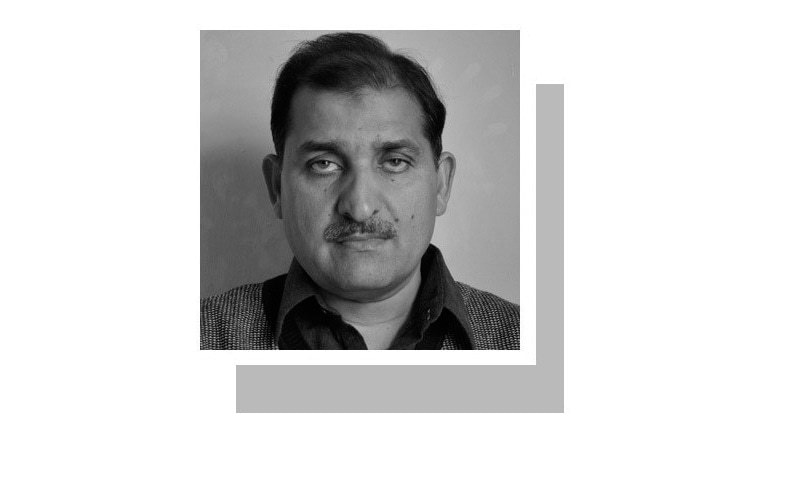
BY seizing the strategically located Sangin district, with a population of less than 100,000, Taliban insurgents have gained control of more than 50 per cent of southern Helmand province. The town has literally been a major killing field for British, US and Afghan soldiers over the past 16 years of war in Afghanistan.
A vital supply route for security personnel stationed in the provincial capital Lashkargah, Sangin has been the scene of brazen Taliban attacks for the last eight months or so. Straddling a scorched desert and a lush river valley that Nato commanders once described as a ‘green zone’, Sangin fell to the Taliban as a result of a predawn assault on Thursday.
The ragtag Afghan forces — fatigued, outgunned and short of ammunition and food — took to their heels. As TV channels around the world screened images of audacious fighters marauding through the district centre and police headquarters, a patently clueless Ministry of Defence in Kabul characterised the security forces’ meek surrender of the major urban space as a tactical retreat.
Sangin’s collapse, which the US military has euphemistically called the repositioning of the district centre, represents the culmination of a ferocious offensive that has been deadlier than the battles for any of the country’s other 400 districts. Following the 2013 security transition from NATO to local forces, hundreds of Afghan soldiers and policemen have died defending the district.
After capturing Sangin, where the international fraternity has invested heavily, the Taliban are now better positioned to coordinate their operations in Helmand and Kandahar, the group’s spiritual base. Seen in this context, abandoning Sangin will turn out to be a costly mistake. Although the American-led coalition bombed the area to destroy strategic assets, the fighters were able to seize some of the vehicles, weapons and equipment abandoned by the soldiers.
The district is one of Afghanistan’s deadliest battlefields.
While ensconced in Sangin, the emboldened militants will obviously step up their recruitment drive and mobility north of the embattled province, known as Afghanistan’s drug capital. Helmand accounts for more than 50pc of the total opium production within the country.
The rebels, posing more like godfathers than a government-in-waiting, generate much of their revenue from the narcotics trade — worth roughly $3 billion a year. In what looks like icing on the cake, the Taliban also recruit from the large pool of labourers, mostly young men, who converge on Helmand during the opium harvest season.
Come spring, the Taliban lay down their arms to work as daily wagers on lush green poppy fields in Sangin and other districts of Helmand. Additionally, the guerrillas collect a 10pc tax (ushr) on opium produce. Growers, however, cannot summon the courage to say that Islam orders the distribution of ushr to the needy, not warriors.
Buffeted by increasing unemployment and poverty, many of those coming in from all over the country tend to become willing hires for the militant movement. Heavy rainfall, cancellation of annual eradication campaigns and perennial violence betoken a greater income for the Taliban and a higher opium yield in Helmand this year.
Illustrative of Taliban’s rising control in the chaotic south, the fall of Sangin will bust the morale of Afghan forces and their Nato partners, who are now more focused on training than combat. Again, this tactical shift afforded the insurgents a good opportunity to escalate their armed struggle.
In Sangin, which has changed hands several times since 2001, many British and American service members, just like their Afghan counterparts, have lost their lives. More than 100 of the 456 British fatalities in Afghanistan over the past 16 years have occurred in this restive city.
British troops, moving into Helmand in 2006, failed to deliver on their oft-repeated promise of bringing security, good governance and reconstruction to the province. Their failure came in for a lot of flak from ex-president Hamid Karzai and senior US military commanders in Afghanistan.
Thousands of US Marines ventured into Sangin, Nawa, Garmser, Marjah, Khanshin and Nawzad districts in 2010; at least 20 were killed in Sangin within the first three months of deployment. Ironically enough, the city is still mired in a whole host of problems, including misgovernance and corruption.
Government officials, who are supposed to crack down on poppy cultivation, are allegedly complicit in the opium trade. As if competing with the militants for cash, government servants help farmers cultivate and harvest the illicit crop. There is enough reason to believe the drug business has become institutionalised in Sangin and other parts of Helmand.
As things stand, one can safely predict an escalation of air and ground offensives in Sangin and, indeed, throughout the province. If the Taliban retains control of the district — a tough challenge — the fighting is bound to spill over into neighbouring Kandahar.
The writer is a freelance journalist based in Peshawar.
Published in Dawn, March 26th, 2017










































